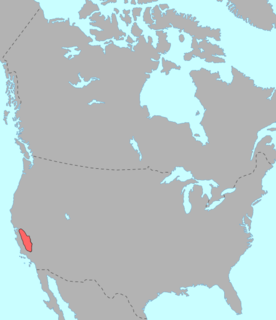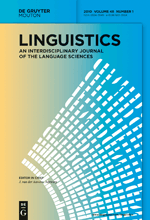Computational linguistics is an interdisciplinary field concerned with the computational modelling of natural language, as well as the study of appropriate computational approaches to linguistic questions. In general, computational linguistics draws upon linguistics, computer science, artificial intelligence, mathematics, logic, philosophy, cognitive science, cognitive psychology, psycholinguistics, anthropology and neuroscience, among others.

Joseph Harold Greenberg was an American linguist, known mainly for his work concerning linguistic typology and the genetic classification of languages.
Theoretical linguistics is a term in linguistics which, like the related term general linguistics, can be understood in different ways. Both can be taken as a reference to theory of language, or the branch of linguistics which inquires into the nature of language and seeks to answer fundamental questions as to what language is, or what the common ground of all languages is. The goal of theoretical linguistics can also be the construction of a general theoretical framework for the description of language.
Language isolates are languages that cannot be classified into larger language families. Korean and Basque are two of the most commonly cited examples, although Korean is actually a member of the Koreanic language family. Others include Ainu in Asia, Sandawe in Africa, and Haida in the Americas. The number of language isolates is unknown.

Na-Dene is a family of Native American languages that includes at least the Athabaskan languages, Eyak, and Tlingit languages. Haida was formerly included, but is now considered doubtful. By far the most widely spoken Na-Dene language today is Navajo.
Applied linguistics is an interdisciplinary field which identifies, investigates, and offers solutions to language-related real-life problems. Some of the academic fields related to applied linguistics are education, psychology, communication research, information science, natural language processing, anthropology, and sociology.

The Association for Computational Linguistics (ACL) is a scientific and professional organization for people working on natural language processing. Its namesake conference is one of the primary high impact conferences for natural language processing research, along with EMNLP. The conference is held each summer in locations where significant computational linguistics research is carried out.

The Linguistic Society of America (LSA) is a learned society for the field of linguistics. Founded in New York City in 1924, the LSA works to promote the scientific study of language. The society publishes three scholarly journals: Language, the open access journal Semantics and Pragmatics, and the open access journal Phonological Data & Analysis. Its annual meetings, held every winter, foster discussion amongst its members through the presentation of peer-reviewed research, as well as conducting official business of the society. Since 1928, the LSA has offered training to linguists through courses held at its biennial Linguistic Institutes held in the summer. The LSA and its 3,600 members work to raise awareness of linguistic issues with the public and contribute to policy debates on issues including bilingual education and the preservation of endangered languages.

Yokuts, formerly known as Mariposa, is an endangered language spoken in the interior of Northern and Central California in and around the San Joaquin Valley by the Yokuts people. The speakers of Yokuts were severely affected by disease, missionaries, and the Gold Rush. While descendants of Yokuts speakers currently number in the thousands, most of the constituent dialects are now extinct.

Kalapuyan is a small extinct language family that was spoken in the Willamette Valley of Western Oregon, United States. It consists of three languages.

The Malayic languages are a branch of the Malayo-Polynesian subgroup of the Austronesian language family. The most prominent member is Standard Malay, which is the national language of Brunei, Singapore and Malaysia; it further serves as basis for Indonesian, the national language of Indonesia. The Malayic branch also includes the local languages spoken by Indonesians and ethnic Malays, further several languages spoken by various other ethnic groups of Sumatra and Borneo. The most probable candidate for the urheimat of the Malayic languages is western Borneo.

Linguistics: An Interdisciplinary Journal of the Language Sciences is a peer-reviewed academic journal of general linguistics published by De Gruyter Mouton. The journal publishes both articles and book reviews. It publishes two special issues a year. The current Editor-in-Chief is Johan van der Auwera. Since 2010, it publishes 1400 pages per year.
Nick C. Ellis is a Welsh psycholinguist. He is currently a professor of psychology and a research scientist at the English Language Institute of the University of Michigan. His research focuses on applied linguistics more broadly with a special focus on second language acquisition, corpus linguistics, psycholinguistics, emergentism, complex dynamic systems approaches to language, reading and spelling acquisition in different languages, computational modeling and cognitive linguistics.
Linguistics is the scientific study of human language. It entails a comprehensive, systematic, objective, and precise analysis of all aspects of language, particularly its nature and structure. As linguistics is concerned with both the cognitive and social aspects of language, it is considered a scientific field as well as an academic discipline; it has been classified as a social science, natural science, cognitive science, or part of the humanities.
The State Institute of Encyclopaedic Publications (SIEP) is a cultural institution founded in 1961 under the Department of Cultural Affairs, Government of Kerala, India with the objective of disseminating knowledge to the people of Kerala in their pursuit of learning. It was constituted as part of the government policy that Malayalam should be used as the medium of education, administration and judiciary.

Applied Linguistics is a peer-reviewed academic journal in the field of applied linguistics established in 1980 and published by Oxford University Press. It appears six times a year. Current editor-in-chief is Christina Higgins.

The Journal of Second Language Writing is a peer-reviewed academic journal in the fields of linguistics and language education. Its scope encompasses all aspects of second and foreign language writing, including writing instruction and assessment. It was established in 1992 and is published quarterly by Elsevier. The current editors-in-chief are Amanda Kibler and Todd Ruecker. The founding editors were Ilona Leki and Tony Silva.
Language Log is a collaborative language blog maintained by Mark Liberman, a phonetician at the University of Pennsylvania.

Language Learning: A Journal of Research in Language Studies is a peer-reviewed academic journal published quarterly by Wiley-Blackwell on behalf of the Language Learning Research Club at the University of Michigan. The editor-in-chief is Nick C. Ellis University of Michigan.

Lourdes Ortega is a Spanish-born American linguist. She is currently a professor of applied linguistics at Georgetown University. Her research focuses on second language acquisition and second language writing. She is noted for her work on second language acquisition and for recommending that syntactic complexity needs to be measured multidimensionally.











